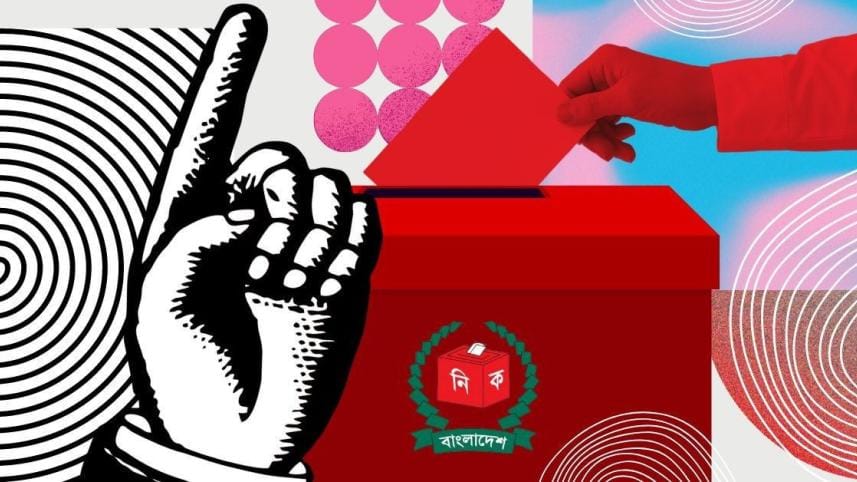A one-day holiday won’t let millions vote

During a national election, the state offers a single public holiday. However, one solitary day is not sufficient for all citizens to wake up, travel hundreds of kilometres, cast their votes, return, and resume work the next morning. In our migration-shaped country, where many travel from rural to urban areas for work, it entrenches disenfranchisement.
After three widely criticised elections that failed to attract voter participation, the upcoming one is being promoted as a turning point—a chance to finally let citizens reclaim their political rights. But legitimacy cannot be restored through empty gestures. When most voters are "absent" from their registered hometowns, a single day off is a symbolic gesture, not genuine access.
Bangladesh's internal migration is massive as thousands of people move to Dhaka, Chattogram, Gazipur, and Narayanganj—the industrial lungs of the economy—while their voter registration remains tied to ancestral addresses. Millions of registered voters live far from where they are originally registered. In the 2014 election, turnout was around 40 percent nationwide and as low as 22 percent in some constituencies of Dhaka. That low participation was not only due to political boycotts but also due to logistical impossibility. It is unrealistic to travel kilometres after work, vote the next day, and be back at the workplace by morning. Buses are overbooked, transport runs on a skeletal schedule, and workers bound for shifts cannot afford two full days off. As a result, millions of urban workers are quietly excluded from democracy.
For the upcoming election, the Election Commission (EC) is reportedly considering a postal voting system for Bangladeshi expatriates. However, the far larger and politically disenfranchised population of internal migrants is missing from this consideration. They build the highways, run the factories, and perform various blue and white-collar jobs that sustain the GDP trend. Yet their votes, unlike those of expatriates, are not being considered.
One might think a public holiday ensures everyone's access. Factories and offices often do not let staff leave early; an extra day off can cost wages or even jobs. Return bus and train tickets can double or triple in price. For low-income urban migrants, that alone is enough to make them surrender their franchise altogether. A "national day off" is a gesture—gestures do not put ballots into voters' hands.
Instead of pretending that one day solves everything, we must reimagine the mechanics of access. For this election, a practical step would be to extend the voting holiday to include the day before or after polling, staggered by division, to reduce economic disruption while giving voters a travel buffer. Bangladesh Railway and BRTC could run reserved services on key routes—such as from Dhaka to the north and south and from port cities to the interiors—ensuring schedules are announced early and tickets remain affordable. Satellite booths could be set up in dense worker zones such as industrial estates, export-processing zones, economic zones, and portside neighbourhoods, with limited booths tied to voters' home constituencies. Employers, too, should be required to grant paid or unpaid leave for travel to vote, beginning with large export industries and urban service sectors.
In the medium term, reforms could include enabling internal migrants to request ballots by post or via secure drop boxes in their city of residence, with biometric verification and a transparent chain of custody to ensure security. Voters should also be allowed to temporarily shift polling stations within their constituency or current city without permanently changing registration. Countries with high internal mobility—India, Indonesia, the Philippines—have already experimented with advance polling, multi-day voting, or absentee ballots to reach internal migrants. Bangladesh can similarly shift from ritual holidays to practical enfranchisement.
Democracy is not about a ceremonial day off; it is about practical access. For a nation that prides itself on development metrics, our electoral logistics remain stubbornly primitive. We can send satellites into orbit and export billions in garments, yet somehow we cannot guarantee a worker two extra days or a bus seat to exercise a constitutional right.
The upcoming election is expected to restore public faith in institutions. But a credible poll needs more than open competition—it needs inclusivity. Nothing says "this election belongs to the people" if millions are left stranded between work and home, between eligibility and access. We must make time, transport, and logistics part of the rights we promise.
Parthib Mahmud is business analyst at Ontik Advisory.
Views expressed in this article are the author's own.
Follow The Daily Star Opinion on Facebook for the latest opinions, commentaries and analyses by experts and professionals. To contribute your article or letter to The Daily Star Opinion, see our guidelines for submission.




 For all latest news, follow The Daily Star's Google News channel.
For all latest news, follow The Daily Star's Google News channel. 

Comments